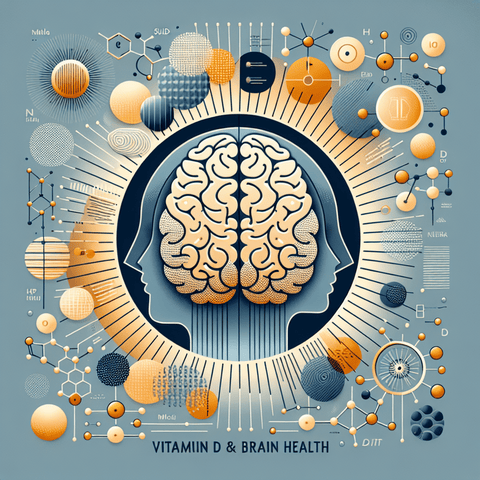In today’s health-conscious society, the role of nutritional supplements has gained significant attention, especially when it comes to optimizing brain function and cognitive performance. Increasing demands from our daily routines, age-related changes, and lifestyle factors have highlighted the importance of maintaining optimal nutrient levels that support not only physical health but also mental clarity and emotional resilience. Among these vital nutrients, Vitamin D3 stands out as a powerhouse with promising benefits far beyond its traditional association with bone health. Recent scientific research underscores its pivotal role in promoting brain health, enhancing cognitive functions, and safeguarding neural integrity. This comprehensive guide explores the fascinating ways Vitamin D3 can unlock your brain’s full potential, offering insights into its mechanisms, benefits, practical usage, and tips for maximizing cognitive performance naturally.
Introduction to Vitamin D3 as a Key Nutritional Supplement for Brain Optimization
Vitamin D3, also known as cholecalciferol, is widely recognized for its crucial role in calcium absorption and maintaining healthy bones. However, burgeoning scientific evidence reveals that its functions extend well beyond skeletal health. Our bodies synthesize Vitamin D3 naturally when our skin is exposed to sunlight, making it a unique nutrient that bridges environment and biology. Despite its importance, deficiencies of Vitamin D3 are surprisingly common, affecting people of all ages due to limited sun exposure, geographic location, lifestyle habits, and dietary intake.
Recently, the scientific community has shifted focus toward exploring Vitamin D3’s influence on non-skeletal tissues, especially the brain. The rising interest stems from studies indicating that optimal Vitamin D3 levels are associated with better cognitive performance, mood stability, and a lowered risk of neurodegenerative diseases. As researchers uncover more about its multifaceted roles, the potential for Vitamin D3 to serve as a natural, accessible tool for brain health and cognitive enhancement becomes increasingly apparent. While more research is ongoing, current findings strongly suggest that maintaining adequate Vitamin D3 levels can be a key component of a holistic approach to cognitive wellness and mental vitality.
How Vitamin D3 Supports Brain Function and Neural Communication
Central to understanding the brain-boosting properties of Vitamin D3 is recognizing its interaction with specific receptors expressed throughout the nervous system. The brain contains Vitamin D3 receptors (VDRs) in various regions, including the hippocampus, cortex, and areas involved in learning and memory. These receptors indicate that Vitamin D3 plays an active role in modulating neural activity and supporting overall brain homeostasis.
The science behind this interaction reveals that Vitamin D3 influences neural communication by regulating the synthesis of neurotransmitters—chemical messengers crucial for transmitting signals between neurons. For example, it is involved in the synthesis of serotonin, a neurotransmitter linked to mood regulation, and dopamine, which influences motivation and focus. Adequate Vitamin D3 levels help ensure that these neurotransmitters are produced and function optimally, thereby promoting mental clarity and emotional stability.
Furthermore, Vitamin D3 contributes to maintaining the structural integrity of neurons and promotes brain plasticity—the brain’s ability to reorganize itself by forming new neural connections throughout life. This plasticity is vital for learning, memory formation, and recovery from neural injuries. By supporting neural connectivity, Vitamin D3 effectively helps the brain adapt to new challenges, optimize information processing, and sustain mental agility, even as we age. Researchers are actively studying how Vitamin D3 modulates gene expression related to neurogenesis (the growth of new neurons), adding yet another layer to its neuroprotective potential.
Cognitive Enhancement through Vitamin D3: Sharpening Memory and Focus
Extensive research links Vitamin D3 levels to various aspects of cognitive performance, from memory retention to executive functions like planning and problem-solving. Observational studies suggest that individuals with sufficient Vitamin D3 tend to perform better on cognitive assessments compared to those who are deficient. In particular, Vitamin D3 appears to influence areas such as learning capacity, mental speed, and the ability to concentrate.
Supplementing with Vitamin D3 has been shown to improve memory recall and learning efficiency. A meta-analysis of clinical trials highlighted that individuals taking Vitamin D3 supplements experienced notable improvements in verbal and visual memory tests. The mechanisms behind these effects involve enhanced neurotransmitter synthesis, reduced neuroinflammation, and improved neural signaling pathways. Additionally, Vitamin D3’s anti-inflammatory properties help mitigate chronic inflammation in the brain, which is increasingly recognized as a contributor to cognitive decline.
To incorporate Vitamin D3 into your daily routine for cognitive benefits, consider taking supplements that match your specific needs. For example, if you struggle with focus or mental fatigue, choosing a high-quality Vitamin D3 supplement can provide a stable foundation for mental performance. It’s advisable to consult with a healthcare professional to determine your current Vitamin D3 levels through testing and to set an appropriate dosage. Additionally, pairing Vitamin D3 with other brain-boosting nutrients such as Omega-3 fatty acids (found in DHA-EPA supplements) may result in synergistic benefits, further enhancing cognitive resilience and mental clarity. For those interested in premium supplementation options, exploring products like DHA/EPA Omega-3 Supplements can support comprehensive brain health.
Neuroprotective Effects of Vitamin D3 Against Age-Related Cognitive Decline
As we age, our brain cells become more vulnerable to oxidative stress and chronic inflammation—both of which are implicated in neurodegenerative conditions like Alzheimer’s disease and Parkinson’s disease. Ensuring adequate Vitamin D3 levels has been associated with a reduced risk of such age-related decline, primarily due to its neuroprotective properties. Vitamin D3 acts as an antioxidant, scavenging harmful free radicals that can damage neural tissues. Its anti-inflammatory effects help reduce the inflammatory cascade that can accelerate neurodegeneration.
Research indicates that Vitamin D3 deficiency correlates with increased amyloid plaque accumulation—a hallmark of Alzheimer's pathology—and with poorer cognitive scores in elderly populations. Conversely, sufficient Vitamin D3 levels are linked to higher brain volume in critical regions involved in cognition. Furthermore, longitudinal studies suggest that maintaining optimal Vitamin D3 levels can slow cognitive decline, improve white matter integrity, and support synaptic function. Early intervention through supplementation may, therefore, serve as a protective strategy to preserve mental sharpness and prevent or delay neurodegenerative diseases.
Adopting lifelong habits that include regular sunlight exposure, adequate dietary intake, and supplementation when necessary can help maintain brain health across the lifespan. To access high-quality Vitamin D3 supplements, visit Vitamin D3 categories to find products tailored for neuroprotection and overall wellness.
Achieving Mental Clarity and Emotional Well-being with Vitamin D3
Beyond cognitive performance, Vitamin D3 influences mental health by regulating mood and emotional resilience. The prevalence of depression and anxiety is linked to Vitamin D3 deficiency, with studies suggesting that adequate levels can help alleviate symptoms and promote emotional stability. This connection is partly due to Vitamin D3’s role in serotonin synthesis, a neurotransmitter intricately involved in mood regulation.
Individuals with low Vitamin D3 levels often report feelings of fatigue, mental fog, and decreased motivation. Supplementing with Vitamin D3 can improve mental clarity, reduce feelings of fatigue, and enhance overall well-being. Additionally, Vitamin D3’s influence on inflammation reduces neuroinflammation associated with depression and anxiety disorders. Clinical trials have demonstrated improvements in mood scores among participants who corrected their Vitamin D3 deficiencies, highlighting its potential as a natural aid in mental health management.
Incorporating Vitamin D3 can be part of a comprehensive approach to emotional well-being, complemented by stress management techniques, regular physical activity, and balanced nutrition. For optimal results, consult healthcare professionals to establish appropriate supplementation strategies. To support mental clarity and emotional health, consider choosing high-quality Vitamin D3 supplements available at Topvitamine’s Vitamin D category.
Comprehensive Benefits of Vitamin D3 for Brain Health and Beyond
In sum, Vitamin D3 offers a multifaceted array of benefits critical to maintaining a vibrant, resilient, and healthy brain. It plays a fundamental role in supporting neural communication, enhancing cognitive functions, protecting against age-related decline, and regulating mood. Additionally, the neuroprotective effects of Vitamin D3 extend to broader health benefits, including improved immune function, bone health, and inflammatory regulation. Proper supplementation, combined with a healthy lifestyle, can help unlock your brain’s full potential and foster lifelong mental vitality.
Safe supplementation practices involve monitoring your Vitamin D3 levels and adhering to recommended dosages to avoid toxicity. Daily intake recommendations vary depending on age, lifestyle, and existing health conditions, but generally, maintaining serum levels within a safe and effective range is key. When selecting supplements, prioritize high-quality products that undergo rigorous testing for purity and potency. Combining Vitamin D3 with other nutrients such as Magnesium—integral for Vitamin D metabolism—can further optimize bioavailability and effectiveness. Explore options at Magnesium products, which support overall health and complement Vitamin D3’s benefits.
Practical Guidance on Choosing and Using Vitamin D3 Supplements
Assessing your Vitamin D3 status is the first step toward optimal brain health. Healthcare providers can perform blood tests to measure serum 25(OH)D levels, providing a clear picture of your current status. Based on your results, a personalized supplementation plan can be recommended. When shopping for supplements, look for reputable brands that guarantee potency, purity, and safety certification. Choosing oils or capsules with added Vitamin K2 can enhance calcium metabolism and support cardiovascular health, aligning with overall wellness goals. For high-quality options, explore products at Vitamin K benefits.
To maximize the cognitive benefits of Vitamin D3, consider pairing it with other brain-boosting nutrients. Omega-3 fatty acids, particularly DHA, are well-known for supporting membrane fluidity and neuronal function. Taking a comprehensive supplement like DHA/EPA Omega-3 products alongside Vitamin D3 can amplify positive effects on cognition and mood. Additionally, ensuring sufficient magnesium intake can enhance Vitamin D3 activation and utilization, supporting overall brain health and energy levels.
Conclusion: Empower Your Brain with the Right Nutritional Support
Harnessing the power of Vitamin D3 offers a promising, scientifically backed approach to enhancing brain health, sharpening cognition, and maintaining emotional balance. As research continues to illuminate its multifaceted roles, it becomes clear that ensuring optimal Vitamin D3 levels is an essential aspect of lifelong mental vitality. Whether through sunlight exposure, dietary choices, or supplementation, taking proactive steps to support your brain can lead to improved focus, mood, and overall well-being. Remember, personalized guidance from healthcare professionals is vital to safely and effectively incorporate Vitamin D3 into your health regimen. Embrace the potential of this remarkable nutrient and unlock your brain’s full capabilities today!
Q&A Section
Q1: What is the recommended daily intake of Vitamin D3 for optimal brain health?
The recommended daily intake varies based on age, lifestyle, and existing health conditions. Generally, adults are advised to aim for 600–800 IU of Vitamin D3 daily, with some individuals requiring higher doses to reach optimal serum levels. It is best to consult with a healthcare professional to determine your specific needs through blood testing and personalized recommendations.
Q2: How can I naturally increase my Vitamin D3 levels?
Natural ways to boost Vitamin D3 include regular sunlight exposure—around 15–30 minutes several times a week—especially during midday when UVB rays are strongest. Incorporating Vitamin D-rich foods such as fatty fish, egg yolks, and fortified products can also help. However, for many, supplementation is an effective way to achieve and maintain adequate levels, particularly in regions with limited sunlight.
Q3: Are there any risks associated with Vitamin D3 supplementation?
While Vitamin D3 is generally safe when taken within recommended dosages, excessive intake can lead to toxicity, causing symptoms such as nausea, weakness, and high calcium levels. Monitoring your blood levels and adhering to medically advised dosages minimizes risks. Always choose high-quality supplements and consult healthcare providers before starting any new supplement regimen.
combining Vitamin D3 with Omega-3 fatty acids (DHA-EPA), Magnesium, and Vitamin K2 can potentiate its benefits on brain function and overall health. These nutrients work synergistically to support neural integrity, membrane fluidity, and calcium metabolism, creating a more comprehensive approach to cognitive wellness.
Important Keywords
- Vitamin D3 for brain health
- Cognitive enhancement
- Neuroprotection
- Memory and focus improvement
- Vitamin D deficiency
- Neural communication
- Preventing cognitive decline
- Mental clarity and mood regulation
- Brain aging prevention
- Supplements for brain health



